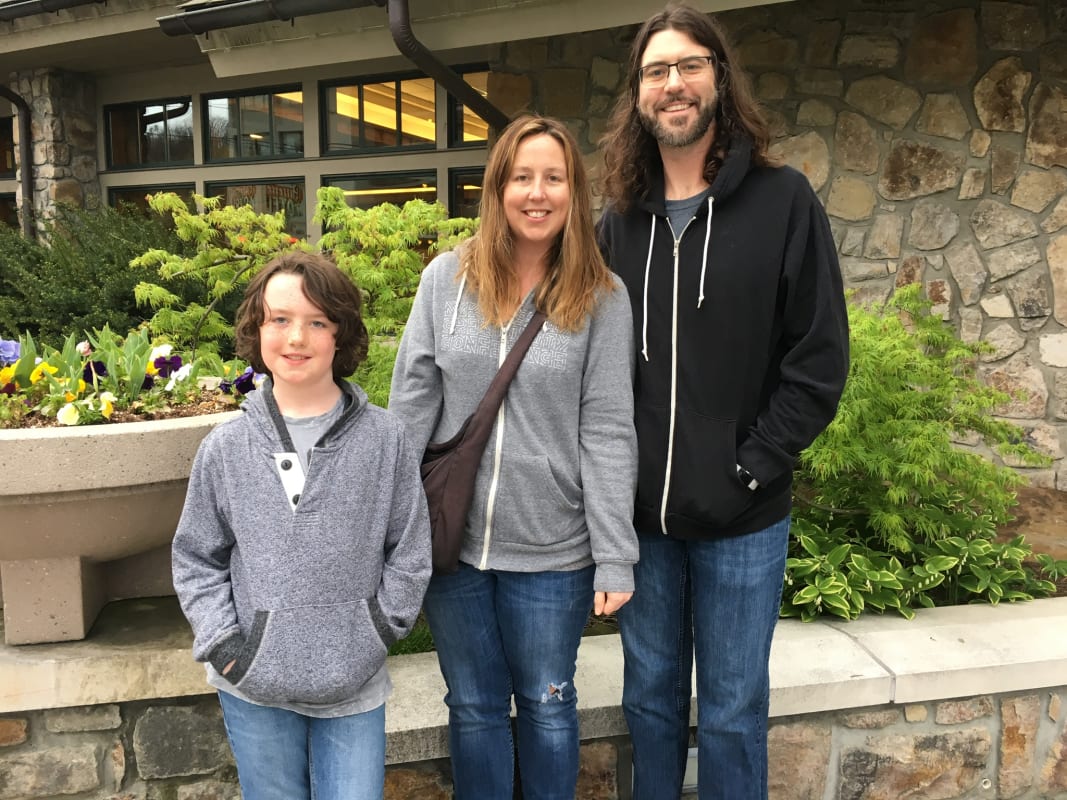
In our Your Stories series, people who have lost a loved one share their unique perspective through essays, poetry and artwork. This week, Jessica Marcellus takes on the tricky issue of when to start dating after the death of a partner.
Two years ago, at Christmas time, I sat on the couch beside my husband Dan, the room aglow with the soft reds and greens of twinkling lights woven around a freshly cut balsam fir. Notes of Christmas carols drifted into the room from a staticky old radio in the kitchen, the volume dialed low; the room was otherwise quiet.
Using the firm, protruding surface of my nine months pregnant belly, I folded a tiny mountain of freshly laundered infant clothing. I held each cotton onesie, each fuzzy sleeper over my abdomen, marvelling that the kicking, squirming little stranger inside me would be wearing these clothes in just a few short weeks.
After a while, Dan spoke, breaking what had been a sustained, evening-long silence between us.
“What do you think you’ll do with your rings?” he asked. “After I… you know.” He didn’t elaborate further. But I did know. After he died.
Dan had brain cancer. He had been diagnosed with the horrific, inoperable tumor just two months earlier. And now, here we were, trying to wrap our heads around the fact that he likely wouldn’t live to celebrate our child’s first birthday. All this at a time when most parents-to-be were worrying over whether to paint the nursery Chambray Blue or Cape Cod Gray.
“What do you think you’ll do with your rings?” he asked. “After I… you know.” He didn’t elaborate further. But I did know. After he died.
I bowed my head, glancing down at the diamond ring on my left hand, its princess-cut stone glinting prettily in the multicolored glow cast by the tree lights. I studied the platinum setting, then each tiny inlaid stone of the matching wedding band, the prolonged scrutiny an attempt to hide the heat that had sprung to my cheeks, the water in my eyes.
Aware that several minutes had gone by, I finally looked up to meet his gaze. There were tears in his eyes, too.
“I couldn’t imagine taking them off,” I admitted, truthfully. He nodded. Paused.
“Well, I’d hope you would get married again someday.” He said it matter-of-factly, but the magnitude of his words hung in the air between us, palpable.
“Me, too, honey.”
To this day, I consider myself lucky, in a sense, that Dan vocalised his wish for me to find someone else after he was gone. Some people, especially those who lose their partners suddenly or unexpectedly, aren’t granted the luxury of this formal approval. Others still never have a conversation such as ours due to the discomfort it could induce.
But regardless, I suppose, of a deceased partner’s thoughts or wishes on the subject, the topic of finding love again will inevitably cross the minds of most, if not all surviving halves at some point. The question, then, becomes: how soon after loss is it appropriate to begin dating?
The simple answer is, of course, that there isn’t one. Or, what every information-seeker wants to hear: it depends. But really, it does. So many factors are at play in deciding when to reenter what can be a simultaneously ominous and exciting dating scene.
Was your partner’s death sudden, or expected? Did it happen as a result of a long illness? Did you have children together? Would you like to have more someday? Do you feel well supported in your grief? Are you ready to risk more heartbreak, after already experiencing an unimaginable one?
In my case, the first six months after Dan died were spent focusing solely on raising my infant son and figuring out how the hell to survive on my own. I had no energy, no space in my soul, for anything other than those two tasks.
I was 26 years old when I became a widow. I knew I wanted to love someone again; wanted to have more children; wanted our son to have a father figure in his life someday.
So, I spent a month visiting my sister in Florida. I studied books on grieving, read novels, memoirs. I learned to use the zero-turn lawnmower — bumped along the uneven ground of our 2.5 acres on late-summer evenings with a baby monitor balanced between my knees.
I adjusted, mostly, to the quiet of the house at night after putting Sawyer to bed; to the absence of Dan’s State Police cruiser from its usual spot in the driveway; to the empty space in our bedroom closet and in our king-sized bed. Little by little, I learned to live with each of these unfamiliar, undesired vacancies, facing them anew each day until, gradually, they became less glaring.
Beneath the thickest fog of grief, though — even in those first few months — existed an embryonic desire to fill in those hollow spaces created by Dan’s absence. I was 26 years old when I became a widow. I knew I wanted to love someone again; wanted to have more children; wanted our son to have a father figure in his life someday.
Nothing truly prepares you for losing the person you thought you’d spend your life with.
I’d also already experienced a good deal of what is so neatly termed “anticipatory grief” — that which occurs before an impending loss. In the nine months between Dan’s diagnosis and his death, I’d done my absolute best to prepare for a future without him. I’d forced myself to visualize the inevitable decline in health, the physical act of dying, the utter heartbreak and loneliness I would feel once he was actually gone. I’d also imagined — painfully, reluctantly, hopefully — the possibility of happiness with someone else.
Anticipatory grief, admittedly, only gets you so far. The reality is a thousand times worse than anything you could have imagined. Nothing truly prepares you for losing the person you thought you’d spend your life with. And so I’d needed those first six months desperately, to debrief, decompress, pull myself together.
But I do believe that the “preparation” I’d done — forcing myself to feel the emotions of losing Dan in advance, to sit with them, to accept them — contributed to my resilience, and ultimately, to an acknowledgement of my wish to move forward.
Have you thought about when you’ll start dating again?
And so, around that six month mark, a few things happened. First, I resumed the practice of going to the gym, a hobby I’d foregone throughout the course of Dan’s illness. Working out helped me feel strong again, physically and emotionally. And working out alongside an occasional fit, attractive stranger — well, there’s not much explanation needed there.
Second — and for this, I’ll forever be grateful — a few friends brought up the subject of me dating again, and in doing so, made my desire to date feel acceptable.
I can attribute one conversation, in particular, to giving me that nod of approval I’d unknowingly sought after. I was chatting one morning at the gym with a casual friend, who also happened to be the wife of one of Dan’s former coworkers. Known for her directness (a quality of hers which I had always admired), she wasted no time in getting to the point.
“So, there’s something I’ve been wanting to ask you,” she broached. “I think other people have been wondering this too, but have been afraid to bring up the subject — have you thought about when you’ll start dating again?”
“Uhh,” I stumbled over my response, caught off guard by the question. “I haven’t really thought about it much, no,” I answered hesitantly, the fear of judgment apparent even from this woman who clearly had no intention of judging me. She nodded, didn’t probe further.
“If I were in your position,” she offered instead, matter-of-factly, “I think I would wait six months to a year. After that, I feel like I’d want to move on with my life, like I’d be missing out otherwise.”
I didn’t say so then, but those few words were exactly what I needed to hear. Both validating and approving, her sentiment made my desire to love again feel reasonable, practical even. I’d just needed someone to tell me that it was okay.
Despite feeling mostly ready and even a little excited to begin this new chapter, I did still worry what others would think.
A few weeks later, after a rare second glass of wine one evening, I created a Tinder profile. I told no one. I spent a few days swiping through strangers before finally deciding I would meet one of them for coffee. It was only then that I sheepishly confided in a good friend that I would be going on a date. Despite feeling mostly ready and even a little excited to begin this new chapter, I did still worry what others would think.
But in the end, my desire for partnership, for companionship, for laughter, for intimacy — for another chance at the future I’d once envisioned with Dan — was simply greater than my fear of reproval from those around me.
So I went on that coffee date, and I continued dating, for the first time in my adult life. At first, only those closest to me knew of these adventures. I didn’t mention my dating life in casual conversation. I didn’t post about it on social media. It would take more time, and ultimately meeting a man worth mentioning, before I felt ready for the world to know I had “moved on.” But when I did feel ready, I was surprised to find I encountered very little judgement at all.
As I now approach the two-year mark of widowhood, I have no regrets about the way in which I went about dating after Dan, or the timeline I followed. But I’ve also learned that if one certainty about widowhood exists, it’s that everyone’s grief is different. There is no one-size-fits-all approach to tackling it. It is not linear; follows no timeline; has no end. My journey is my own.
Others facing similar circumstances may need more time — or less — before wanting to move forward. To that end, the “right” amount of time, I think, to wait before seeking out new love is however long it takes to begin feeling ready to stop surviving and start living again.
And for those, like me, who need someone to give them the go-ahead? I’ll gladly be that person.
Jessica Marcellus is a NICU nurse and writer living in Fairfax, Vermont. You can find out more about how Jessica and two-year-old Sawyer are getting on by following her Instagram account, @Jess.Marcellus.


